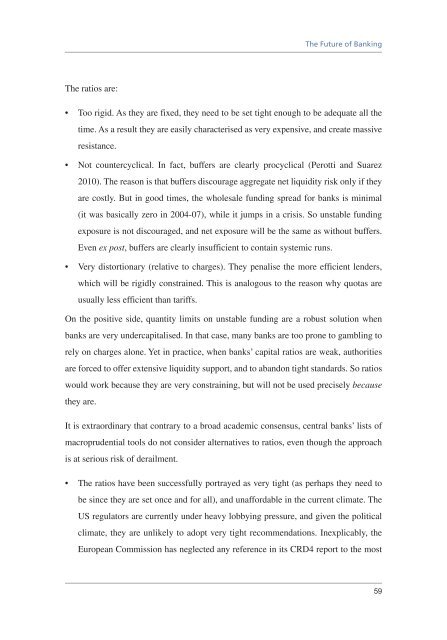You also want an ePaper? Increase the reach of your titles
YUMPU automatically turns print PDFs into web optimized ePapers that Google loves.
The ratios are:<br />
The Future of Banking<br />
• Too rigid. As they are fixed, they need to be set tight enough to be adequate all the<br />
time. As a result they are easily characterised as very expensive, and create massive<br />
resistance.<br />
• Not countercyclical. In fact, buffers are clearly procyclical (Perotti and Suarez<br />
2010). The reason is that buffers discourage aggregate net liquidity risk only if they<br />
are costly. But in good times, the wholesale funding spread for banks is minimal<br />
(it was basically zero in 2004-07), while it jumps in a crisis. So unstable funding<br />
exposure is not discouraged, and net exposure will be the same as without buffers.<br />
Even ex post, buffers are clearly insufficient to contain systemic runs.<br />
• Very distortionary (relative to charges). They penalise the more efficient lenders,<br />
which will be rigidly constrained. This is analogous to the reason why quotas are<br />
usually less efficient than tariffs.<br />
On the positive side, quantity limits on unstable funding are a robust solution when<br />
banks are very undercapitalised. In that case, many banks are too prone to gambling to<br />
rely on charges alone. Yet in practice, when banks’ capital ratios are weak, authorities<br />
are forced to offer extensive liquidity support, and to abandon tight standards. So ratios<br />
would work because they are very constraining, but will not be used precisely because<br />
they are.<br />
It is extraordinary that contrary to a broad academic consensus, central banks’ lists of<br />
macroprudential tools do not consider alternatives to ratios, even though the approach<br />
is at serious risk of derailment.<br />
• The ratios have been successfully portrayed as very tight (as perhaps they need to<br />
be since they are set once and for all), and unaffordable in the current climate. The<br />
US regulators are currently under heavy lob<strong>by</strong>ing pressure, and given the political<br />
climate, they are unlikely to adopt very tight recommendations. Inexplicably, the<br />
European Commission has neglected any reference in its CRD4 report to the most<br />
59














